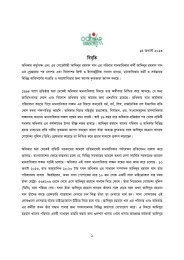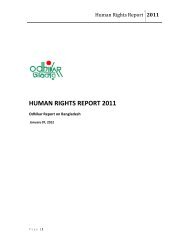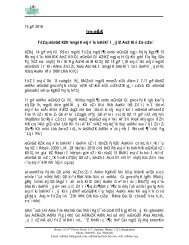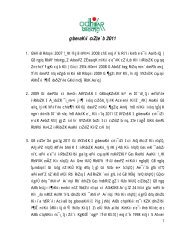Please - Odhikar
Please - Odhikar
Please - Odhikar
Create successful ePaper yourself
Turn your PDF publications into a flip-book with our unique Google optimized e-Paper software.
persons and underwent medical tests. She thought she could bring the rapists to book. She was<br />
wrong, A few weeks into the probe, the investigating officer, Subodh Chakraborty wrote to the<br />
then IG, BST (South Bengal) seeking permission to question the five. Nothing was heard of the<br />
matter thereafter. In the last two years she has been in jail, no Lawyer has taken up her case. As<br />
a final resort, the jail Department intends to request the Law Department to assign her a<br />
Government Lawyer.<br />
The instances of violation on women, including rape, is found in different places and the victims<br />
generally belong to the weaker sections of the society, dalits, tribals or the poor. Often the<br />
women of the disadvantaged sections of the society are tortured or raped to show or prove the<br />
dominance of the higher castes or the economically dominant sections of the society. It is<br />
unfortunately often used as a tool to crush the dissent or protest or to teach a lesson to those who<br />
have the courage to protest. The women are invariably the victims and the agencies of the state<br />
administration, the police, para military forces and the army are responsible for the violation.<br />
Such violations of human rights are often justified on the pretext that such women belong to<br />
lower castes or a tribal community where the women often work outside to earn and have less<br />
restriction on movement compared to the higher castes or economically dominant sections of<br />
the society.<br />
This naturally raises a very pertinent question. Can the responsibility of a crime and consequent<br />
punishment vary depending on the socio-economic background of the victim and the<br />
perpetuator?<br />
Recently, the Supreme Court has set aside 20 judgments of Justice Narain Singh Azad of<br />
Madhya Pradesh High Court awarding cursory prison terms, ranging from a few months to a few<br />
years, to persons found guilty of rape, an offence that attracts a punishment of 7 to10 years'<br />
rigorous imprisonment.<br />
The reason given by Justice Azad for such punishments is interesting.<br />
"The convict is an illiterate labourer from a rural area belonging to a Scheduled Tribe…It<br />
appears to be a fit case to reduce the sentence to the period already undergone," Justice Azad had<br />
noted.<br />
Now, what does literacy and caste have anything to do with a crime, particularly a heinous one<br />
like rape? The apex court felt so. Chief Justice R.C. Lahoti, Justice G.P. Mathur and Justice P.K.<br />
Balsubramnyan unanimously said that the manner of disposal of the cases "exhibited a complete<br />
non-application of mind" and have to be reheard by the high court.<br />
The state deserves a pat on the back for filing appeals in the apex court without being bothered<br />
about caste equations. According to standing counsel C.D. Singh, over 100 judgments of cursory<br />
punishment given by Justice Azad were appealed against in the Supreme Court. Many are still<br />
pending.<br />
Not all high courts can be faulted for insensitivity. But the Supreme Court has, more than once<br />
deprecated such disturbing trends of high courts awarding cursory punishments in rape cases.<br />
The apex court has never minced words towards accused in rape cases, not since the uproar over<br />
its 1978 judgment in the infamous Mathura rape case. It had acquitted two policemen of rape<br />
168<br />
Report 2005











